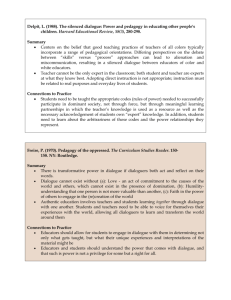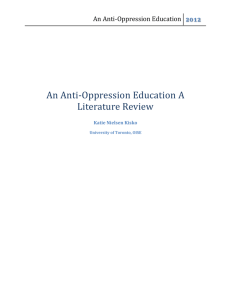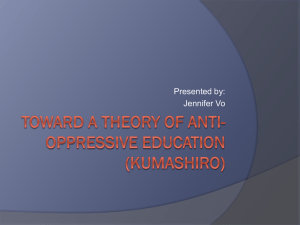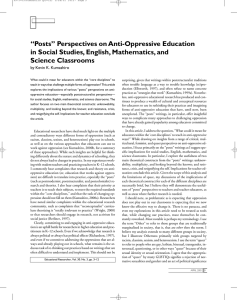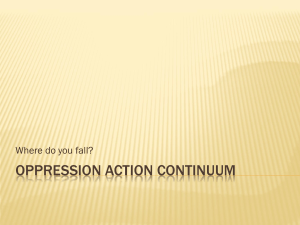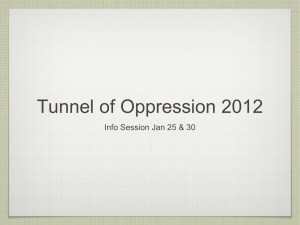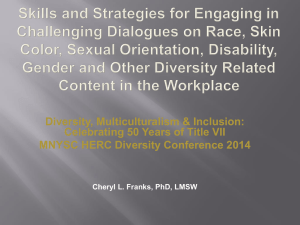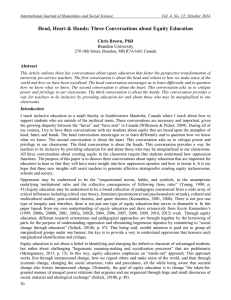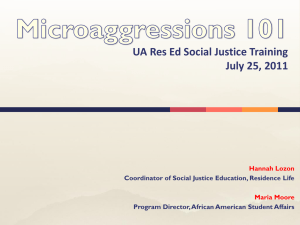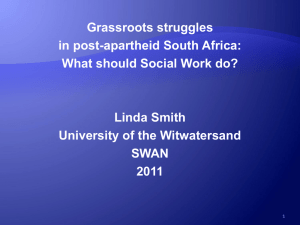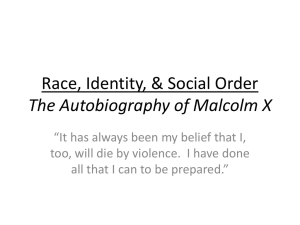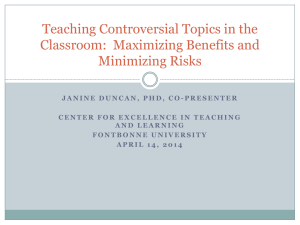Against Common Sense Introduction ECS210
advertisement
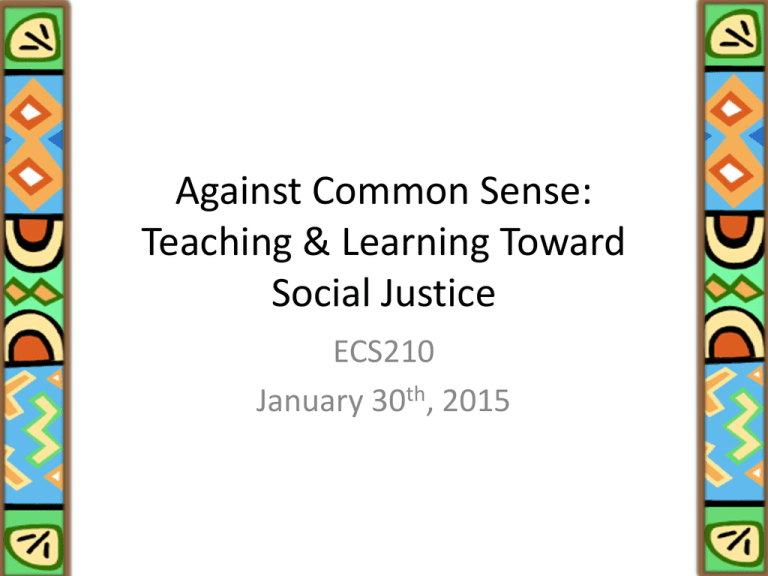
Against Common Sense: Teaching & Learning Toward Social Justice ECS210 January 30th, 2015 Kevin Kumashiro • • • • • • Director, Centre for Anti-Oppressive Education Professor, University of Illinois at Chicago President, National Association for Multicultural Education Teacher, various grade levels in a wide variety of settings Ph.D. In Educational Policy Studies, School of Education Challenges educators to challenge ‘common sense’ Story of Nepal How was Kumashiro challenged in his experience in Nepal? Why did he share this story with us? • What IS common sense? • What makes something common sense? • Is common sense comfortable? • How can common sense be problematic? • How can we begin to challenge, disrupt our own common sense? Rip Van Winkle Story Kevin Kumashiro "Common sense often makes it easy to continue teaching and learning in ways that allow the oppressions already in play to continue to play out unchallenged in our schools and society.” Kumashiro, K. Against Common Sense, 2004, p. XXIV What is good teaching? Commonsensical definition of ‘good teaching’… “Good teaching was not something we needed to learn; rather, it was something we had already learned.” “…embedded in any way of thinking about teaching & learning are values & perspectives, including values & perspectives that can be quite oppressive (i.e. that privilege or favour certain was of being in this world and marginalize or disadvantage others.” What does our teaching make possible? What does our teaching make impossible? What is Oppression? “Oppression refers to a social dynamic in which certain ways of being in this world are normalized or privileged while others are disadvantaged or marginalized” Who does our current education system privilege? Marginalize? Center for Anti-Oppressive Education DEFINITION OF "ANTI-OPPRESSIVE EDUCATION" • Teaching involves both intended and unintended lessons, and it is often in the unintended, hidden lessons that racism, sexism, and other "isms" find life. • Learning involves both a desire for and a resistance to knowledge, and it is often our resistance to uncomfortable ideas that keeps our eyes closed to the "isms." • Common sense does not often tell us that oppression plays out in our schools. But the contradictions in education make it impossible to say that oppression is not in some way affecting what and how we teach, despite our best of intentions. What might it mean, then, to teach in ways that challenge oppression? • http://antioppressiveeducation.org//definition.html Messages from Kumashiro • Teaching towards social justice does not mean teaching the “better” curriculum or the better story; rather, it means teaching students to think independently, critically, and creatively about whatever story is being taught, whether that is the dominant narrative or any number of alternative perspectives from the margins.” p. xxv Kumashiro Challenges Educators to: • Understand that oppressive education can go on in unnoticed ways • Question those things that we take for granted, because maybe they are part of the problem • Understand that anti-oppressive education may be uncomfortable and controversial • Challenge all forms of oppression in classrooms, both intentional and unintentional • Empower minority groups to have an equal opportunity to become well educated citizens • See that many of the problems arise from racial unawareness on the part of the educators. Ask, “How do our practices contribute to oppression?” • Teacher as Learned Practitioner • Teacher as Researcher • Teacher as Professional Against Common Sense (Kumashiro) Chapter One: Three Teacher Images in U.S. Teacher Education Programs Against Common Sense Images of Teacher Teachers as Learned Practitioner Learn about students, the what and how to teach Blend theory & practice Problematic: • little focus on differences, equity, power and oppression. • only certain ways of knowing students privileged Need to: • Trouble & disrupt knowledge • See different insights, identities, practices & changes it makes possible while critically examining to see what it closes off • To teach the contradictions, the gaps Huebner’s Messages: • We must surpass technical foundations of education • We require historical awareness of: – where we once were – sensitivity to present problems, resistances and binds – and openness to future possibilities Dwayne E. Huebner’s (1923 - ) Philosopher of education and curriculum theorist Teacher as Researcher To be lifelong learners To reflect on own teaching practices, readings, discussions To do research projects, working to bridge theory to practice Learning to teach involves reflecting on, raising own questions and doing research. Problematic: Doing research does not in itself promise anti-oppressive change. Need to: • Look at what we have already learned and want to continue to learn (comfort zone) • Look at what we resist learning (where we feel discomfort). • Ask: what do our students desire learning, how do we desire teaching, and how do these desires make anti-oppressive changes difficult? Paulo Freire (1921-1997) Critical Pedagogy • Freire’s pedagogy starts from a deep love, and humility before, poor and oppressed people and a respect for their "common sense" • Students need to learn to think critically to overcome social constructs that are paralyzing • Urges both students and teachers to unlearn their race, class, and gender privileges and to engage in dialogue with those whose experiences are very different from their own • Move beyond the ‘banking’ system of education Teacher as Professional Learning to teach characterized as an entry into a profession Clear certification expectations with relevant components of program, knowledge, skills, and perspectives valued in society Problematic: • Some in society prescribe ahead of time what all teachers need to know and do and be in order to be “good” teachers • May insist on only certain knowledge and may not encourage troubling knowledge and looking beyond. Need to: • Problematize any effort that claims what it means to be a “good” teacher • Remember commonsensical definitions of good teaching are often complicit with different forms of oppression • Examine “progressive” definitions of good teaching as being partial and contradictory and are always in need of rethought What are the messages to our learners? http://www.education.gov.sk.ca/ministry-overview It’s not only what we teach but what we don’t teach... It’s not only what we do but what we don’t do... It’s not only what we say but what we don’t say... It’s not only what we include but what we leave out... Expanding Teacher Self-Knowledge Expanding Teacher Self-Knowledge (1:27) Since bias is often unconscious, one of the first things we need to do is to be aware of assumptions about our students. Challenge the ‘common sensical’ notions of schooling. • Know own strengths, gifts and weaknesses • Examine own beliefs, values, assumptions • Know own knowledge & limitations of being an antioppressive education • Be willing to feel ‘discomfort’ in learning • Ask what I want to learn/teach & what I resist • Challenge ourselves to learn, unlearn, relearn • Continue to ask: What do I see? Not see? What do I do? Not do? What do I teach? What do I leave out? Why? What kind of learner is privileged in my classroom? Who is marginalized? • AND if you think you have all the right answers, then start asking different questions! Kumashiro urges us to… • Transform schools into spaces where all students will be safe, addressed, and affirmed • Create spaces within schools where students can go for help, support, advocacy, and resources • Change the knowledge that all students have about people who are labeled ‘different’ • Broaden students’ understanding of differences and different groups of people by integrating into the curriculum a richer diversity of experiences, perspectives & materials. Kumashiro, K. (2009). Against Common Sense, p. xxxvii AND remember…“An anti-oppressive teacher is not something that someone is. Rather, it is something that someone is always becoming.” Kumashiro, K. (2009). Against Common Sense, p. 15
